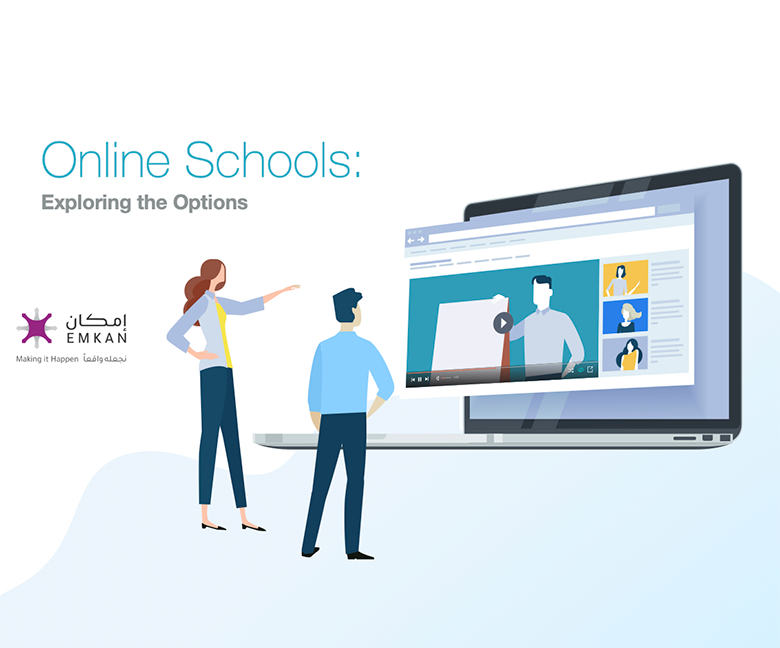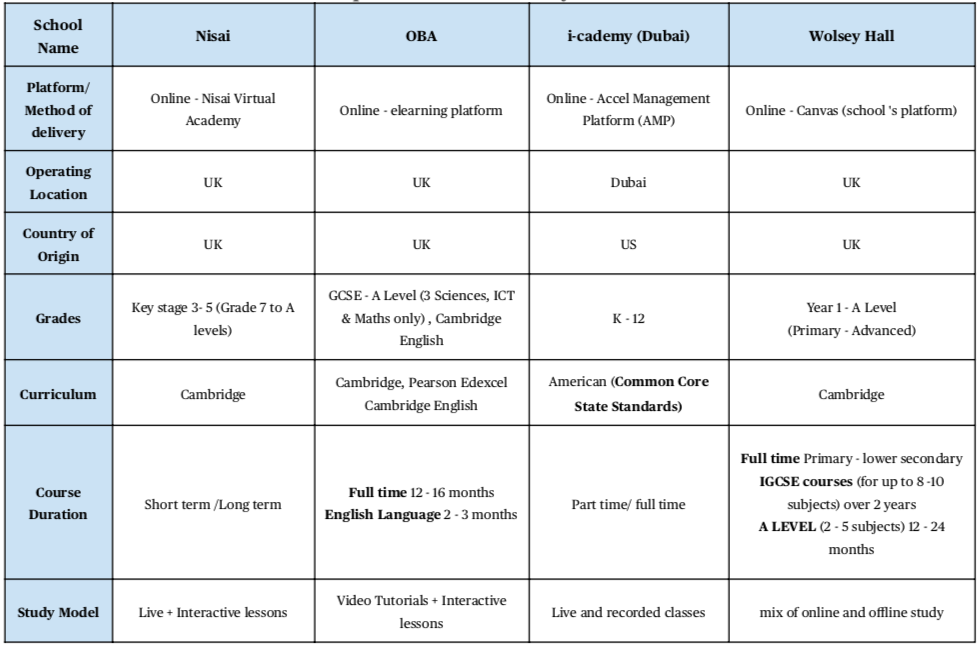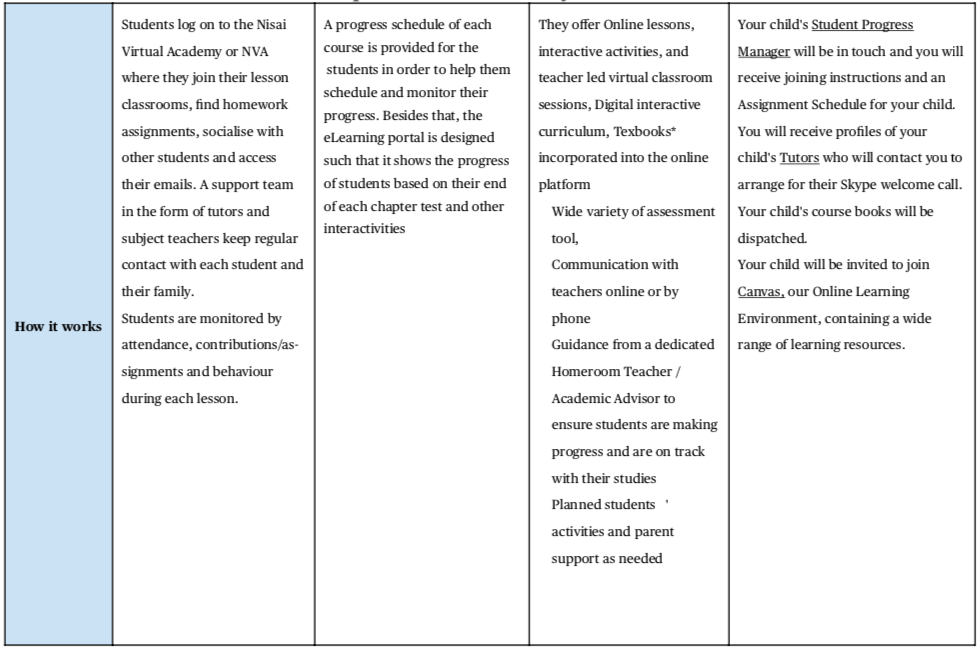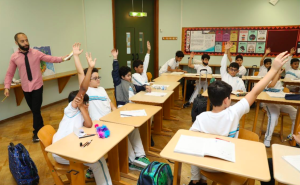Online Schools: Exploring the options

Introduction: the need for this document
As local education experts and schools’ consultants in Saudi, we felt the responsibility of supporting parents to make the right decision for their children and their family’s well being at such confusing times.
This document is not meant to support online schooling or encourage it in any way. This document aims at providing the parents with all the information they need to make an informed decision regarding moving their children to a fully online school, or keep them in their schools (private or public) that offer online learning.
The Current Situation
When the COVID-19 virus hit the GCC countries in March 2020, Saudi MOE decided to make the difficult decision about schools’ closure and moved to online learning for the rest of the semester as a precautionary measure to contain its spread. Not all schools were ready for such a transition, therefore many students, parents, and teachers suffered from a lack of preparations and clear standards to follow within the online learning process.
Recently Saudi MOE announced that schools will resume online for the first 7 weeks of the school year and might be extended if needed. This decision came as a relief to many who were worried about the health and safety of their children, yet many others were frustrated. Online schooling means more pressure on parents to spend more time and effort with their children during school hours, which means less time and energy spent on their work and/or home responsibilities.
Another important factor affecting this situation and aggravating it is the added economic pressure on families’ income. With the 15% VAT implemented since the 1st of July 2020, parents are finding it more difficult to keep their children in private schools with high school fees.
Recently, we noticed that in families with more than 2 children, many parents mentioned that they will not keep them in the same private school if their experience of their children’s online learning of Spring semester 2020 was not positive. Parents will feel they are paying more for less value.
In the height of all these factors, parents in Saudi started to look for alternative schooling options, without jeopardizing the quality of their children’s education, and with lower fees.
What is online schooling?
According to Allen, I. E., & Seaman, J. (2017), online Schooling has been defined as “education that uses one or more technologies to deliver instruction to students who are separated from the instructor and to support regular and substantive interaction between the students. Online education exists all around the world and is used for all levels of education (K-12, college, or graduate school).
Online schools are also referred to as virtual schools or cyber schools. Online schools have virtual classes that students can take from anywhere that has an Internet connection. These schools have a structured curriculum for their students to follow.
The teachers in such schools can work remotely too from anywhere, and according to a set schedule.
Some online schools offer their program per class or subject. Schools provide a full set of classes/ subjects, including extra-curricular activities, all online.
The Difference between Online schooling and Homeschooling
It is important to note that “Online or virtual schooling” is not the same as “Homeschooling” although in some situations both terms are used concurrently.
Home schooling means that the student is not enrolled in any official actual or virtual school, and he studies individually the whole year, using different learning materials and resources, that may or may not involve online learning.
Some parents prefer that their children would be home schooled and just register them for official end of year exams to earn specific qualifications, such as the Cambridge A Levels, the SAT and TOEFL, or others.
The Difference between Online schooling and Homeschooling
It is important to note that Online or virtual schooling is not the same as Homeschooling although in some situations both terms are used concurrently.
Home schooling means that the student is not enrolled in any official actual or virtual school, and he studies individually the whole year, using different learning materials and resources, that may or may not involve online learning.
Some parents prefer that their children would be home schooled and just register them for official end of year exams to earn specific qualifications, such as the Cambridge A Levels, the SAT and TOEFL, or others.
5 Things Online School Should Have:
When choosing an online school for your child, you need to consider the following factors:
1. Accreditation
Accreditation is the most important factor. It provides a measure of legitimacy and a benchmark for quality standards that parents can rely on. Online schools need to either be accredited by MOE or by an international accreditation body.
2. Qualified teachers
Teachers who teach in such schools need to be specially trained to teach and manage students in an online setting. It is not enough for the teacher to be an expert in the subject, or have long years of teaching experience as much as it is important to have flexibility with students, and digital skills. The ability to use digital teaching & evaluation tools and resources are also crucial.
3. Support
During online learning, support is very important to the success of the learning process. Learning and technical support should be part of the services provided to students.
Students need to be able to connect with their teachers in a timely manner during the semester. Teachers should work to make a connection to individual students and be available for voice or video calls outside class time.
Online schools should also provide technical support for students and parents. This can be done in the form of video tutorials, emails, and chat features on the website or platform of the school.
4. Curriculum
The curriculum is the backbone of the education process at any school. It is important for online schools to be clear on which curriculum they will be delivering to students, and what are the learning materials used for that. Online schools offer a variety of international curriculum, such as Cambridge Assessment Education, American Common core, International Bachelorette, Indian CBSE, etc. You will also need to consider the Arabic language and Islamic Studies curriculum offered along them.
5. Non-academic activities
Online schools need to offer opportunities to build connections through virtual classroom discussions, chats and discussion boards. Online schools can offer virtual field trips, clubs, gatherings, and other opportunities for students to connect with their classmates virtually.
Advantages & Disadvantages
Online schools and online learning has a number of advantages:
- Consider health precautions.
- provides a huge library of content, and online research tools
- greater ‘exibility for self-learners or gifted students to explore learning beyond the standard curriculum.
- Students beneft from exposure to others in diffierent cultures of the world,
- gives students ‘exibility with their time for education.
- “develops higher-order skills such as collaborating across time and place and solving complex real-world problems”
- benefcial in rural areas, where the distance between students and educators is vast.
Some disadvantages of the online schools include:
- “lack of socialization” unless supplemented using virtual social activities
- students have a difficult time staying on task
- still there are no seldom methods of evaluating their effiectiveness in educating students.
- technolo&y is unpredictable, which may affiect the quality of the digital tools used
- lack of the ability of the students to exercise and master practical skills, which is essential for many areas of academic development.
Online & Home schooling in Saudi Arabia
Online schools in Saudi Arabia is a fairly new concept, unlike the “Homeschooling” study system, which has been running in Saudi Arabia as an approved method of studying for more than 50 years.
According to MOE policies; students need to have a legitimate reason for them to be enrolled in the Homeschooling system; such as the student’s health condition, or passing the school age (older than 18 years old).
Online schooling has started in Saudi as an initiative from MOE called “Virtual Schools” in 2017 to support students in rural areas. Virtual schools were a digital alternative to actual schools which were more expensive to manage and operate in rural areas around Saudi. It offered students in these distant villages to have access to free official learning through a learning portal, with the condition of having an internet connection.
MOE experience with Virtual Schools has helped it to launch its full online learning management system platform “My School مدرستي”, and re-start online learning again during the Fall semester starting on August 30th 2020.
It is very important to recognize that “Home schooling” in the Saudi education system is not the same as “online schooling”. MOE’s only accredited online schooling platform is “My School مدرستي” where teachers will be able to teach virtual classrooms remotely and the curriculum is provided on the Kingdom’s national education portal (IEN platform بوابة عين).
As mentioned above, MOE accreditation is a key factor for parents’ in making their decision. They have to understand that if a student has been enrolled in any official MOE school, whether public or private, and then decides to drop for a year or two to enroll in an online school that is not approved/accredited by MOE, then this student will be considered a drop out and will need to re-enroll again for that same grade level he/ she stopped at. Such a decision can negatively affect a student’s social and psychological wellbeing.
What are your options?
If you are willing to make the decision and move your son/ daughter to a fully online school, which is not approved by MOE so far, you can find here a list of some of the fully online schools. We gathered information and compared between them in the most important elements.
Recommended Examples of Internationally Accredited Online Schools
How can you make the best decision for your children?
Here are some questions you need to ask before making the decision to move your children from physical schooling to full online schooling:
- Is this situation temporary?
Wether its due to the COVID”19 situation or fnancial pressure, is the reasons that are making you take this decision temporary or permanent? Some situations might clear it in a couple of months, others might take longer. - Am I making this decision out of frustration and agitation? Or Is it the right decision for my child? The past 5 months were a rollercoaster for everyone around the world not just in Saudi, and that effiects us mentally and psychologically. It also effiects our decision making and might push it to make some decisions that are emotional and not rational.
- Is full online schooling accredited and approved from MOE in my country? Until now fully online schools are not accredited by MOE. This might not be an important factor for expats who are temporarily in the Kingdom and will move their families back to their countries in the near future.
- Is the school I chose internationally accredited? Is it affiliated with any local or international body? To make sure that your child is receiving quality education and that you are putting your money in the right place, international accreditation is key.
- Will I really be saving money? Or Is the extra money going to be spent on supporting resources such as tutors and learning materials?
- Will I be able to compensate my child for missed physical social interaction? Consider your child’s lifestyle and social circle, where you live, and your budget.
- How much time and effiort will I need to put with my child during online schooling? No matter how enriching the online school will be, parents will still need to monitor their children during the process.
- Does my family have an alternative plan to go back to regular schooling in case fully online/ homeschooling proves to be not as suitable for your child? As mentioned earlier, MOE accreditation and future plan are the key factors.
Final word
We all want the best for our children, especially when it comes to their academic future. We have to be very cautious in making any hasty decisions that might affiect them on the long run, and make sure that we have all the information we need to make the decision that best suits the family.
Through this document we aimed at presenting you with the material you need to make such informed decisions. We believe in the importance of parents ‘ awareness of the options available for them and their children, and for them not to feel limited to one option. Also, we encourage parents not to make any decision out of frustration, reprisal, or despair. We advise them to list down all the options, discuss it with your family members, and then take that big step.
In the end, children’s education is essential to their development and success, but it will not take them too far without their parents ‘ love and care.
For further support and more information, please contact us on: [email protected]
References:
- Allen, I. E., & Seaman, J. (2017). Digital Compass Learning: Distance Education Enrollment Report 2017. Babson survey research group.
- https://en.wikipedia.org/wiki/Virtual_school
- https://www.understood.org/en/school-learning/choosing-starting-school/home-schooling/faqs-about-online-schools-and-blended-learning
- https://www.accreditedschoolsonline.org/k-12/online-elementary-school/
- Nisai website: https://www.nisai.com
- OBA website: https://www.obaschool.com
- Icademy website: https://icademymiddleeast.com
- Wolsey website: https://wolseyhalloxford.org.uk
- MOE reference: from MOE official resource
Related Articles
Most Popular
Recent Posts











